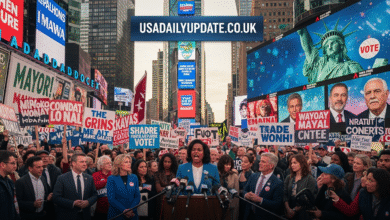Scott Turner HUD: Inside the Bold Leadership Transforming American Housing

Introduction
When you think about government housing leaders, you probably don’t picture a former NFL cornerback. But that’s exactly who’s leading the Department of Housing and Urban Development in 2025. Scott Turner was confirmed by the United States Senate on February 5, 2025, to be the 19th Secretary of the U.S. Department of Housing and Urban Development (HUD). His journey from the football field to the highest levels of housing policy is nothing short of remarkable.
If you’re trying to understand who’s making critical decisions about housing in America right now, you need to know about Scott Turner HUD leadership. His background is unique. His vision is ambitious. And his policies are already making waves across the country. In this article, we’ll explore everything you need to know about the man steering one of the most important federal agencies during a housing crisis that affects millions of Americans.
From the Gridiron to Government: Scott Turner’s Remarkable Journey
The NFL Years That Shaped His Character
Before Scott Turner HUD secretary became a household name in political circles, he was making tackles on Sunday afternoons. During his nine years in the NFL, Scott Turner played cornerback for the Washington Redskins, San Diego Chargers and Denver Broncos. The discipline, teamwork, and resilience he learned on the field would later become the foundation of his leadership style.
Turner wasn’t just another player collecting a paycheck. He also served as a player representative for four years before retiring in 2004. This early leadership role showed his willingness to step up for others—a quality that would define his later career.
Think about it: playing professional football requires dedication and sacrifice. You’re constantly under pressure. You face criticism. You win some, you lose some. These experiences gave Turner a thick skin and a work ethic that translates perfectly into the political arena.
Building a Life After Football
What do you do when your playing days are over? For Turner, retirement wasn’t about resting on his laurels. From 2007 to 2023, Turner worked at Systemware, a content management software company, where he served in various capacities, including chief inspiration officer. He proved he could succeed outside the sports world.
But business wasn’t his only passion. Turner is the founder and president of Community Engagement & Opportunity Council (CEOC), an organization that supports children. He saw problems in his community and decided to do something about them. That’s the kind of hands-on approach he brings to his role as Scott Turner HUD secretary.
His path also led him to Texas politics, where he served in the state legislature. There, he tackled issues like education reform and economic development. Each step in his career prepared him for the massive responsibility he now shoulders.

The Road to Becoming HUD Secretary
Experience in the Trump Administration
Turner’s connection to housing policy didn’t start in 2025. He previously served as Executive Director of the White House Opportunity and Revitalization Council (WHORC). This wasn’t a ceremonial position. During his tenure, Turner led the interagency Opportunity Zones Initiative working with state, local, tribal, and territorial governments across the country to revitalize economically distressed areas, promote affordable housing, and the creation of new businesses.
This experience was crucial. He learned how federal policy impacts real communities. He saw firsthand which programs work and which ones don’t. When President Trump nominated him for HUD secretary, Turner wasn’t a novice—he was someone who understood the complexities of housing policy.
The Confirmation Process
Getting confirmed as a cabinet secretary isn’t easy. You face scrutiny from senators on both sides of the aisle. You answer tough questions about your qualifications and vision. Turner went through this process and emerged successfully when the Senate confirmed him in February 2025.
During his confirmation hearings, Turner emphasized the housing crisis facing Americans. He acknowledged that homeownership is becoming increasingly difficult for average families. His testimony convinced enough senators that he was the right person for the job.
Scott Turner HUD: Policy Priorities and Vision
Tackling the Housing Affordability Crisis
Here’s the reality: millions of Americans can’t afford homes. Prices have skyrocketed. Interest rates have fluctuated. The supply of available housing hasn’t kept pace with demand. As Scott Turner HUD secretary, addressing this crisis is priority number one.
Turner’s approach focuses on increasing housing supply. You can’t solve affordability without building more homes. He’s working with Congress on legislation to reduce barriers to construction. He wants to streamline regulations that make development expensive and time-consuming.
But it’s not just about quantity—it’s about quality too. Turner understands that sustainable communities need good schools, safe streets, and economic opportunities. His vision extends beyond simply putting roofs over heads.
The Opportunity Zones Initiative Expansion
Remember Turner’s work with Opportunity Zones? He’s not abandoning that success. In fact, he wants to expand it. Opportunity Zones incentivize private investment in economically distressed areas through tax benefits.
These zones have the potential to transform struggling neighborhoods. They bring in capital for new businesses, renovated housing, and community facilities. Turner knows this model works because he’s seen it succeed. Now he wants to scale it up nationwide.
Critics argue that Opportunity Zones sometimes lead to gentrification. Turner’s response? Ensure that local communities have a voice in development decisions. Make sure long-time residents benefit from improvements rather than being displaced.
Immigration and Housing Policy
This is where things get controversial. HUD has announced policies requiring proof of citizenship for all tenants in Section 8 housing. This represents a significant shift in how federal housing assistance operates.
Supporters argue this ensures taxpayer-funded housing goes to citizens first. They say it’s about prioritizing Americans during a housing shortage. Critics counter that it could leave vulnerable families homeless and create enforcement challenges for housing authorities.
Whatever your opinion, there’s no denying this policy reflects Turner’s commitment to what he calls “putting Americans first.” It’s a clear example of how Scott Turner HUD leadership differs from previous administrations.
Manufactured Housing and Alternative Solutions
Here’s something you might not expect: Turner is pushing for innovation in housing types. He wants to work with Congress to address the permanent chassis requirement, to unleash more creativity, to bring in more development of manufactured homes.
Why does this matter? Manufactured homes—often called mobile homes—can be built faster and cheaper than traditional construction. They offer a path to homeownership for people who can’t afford conventional houses. By reducing regulatory barriers, Turner hopes to expand access to this housing option.
This isn’t about lowering standards. It’s about recognizing that different families need different solutions. A manufactured home that’s safe, efficient, and affordable can be life-changing for a working-class family.
Controversies and Challenges
The Government Shutdown Website Incident
No discussion of Scott Turner HUD would be complete without addressing recent controversies. HUD Secretary Scott Turner dismisses concerns of violating the Hatch Act by using the agency’s website to blame Democrats for the government shutdown.
During a government shutdown, HUD’s website displayed messages criticizing “the radical left” for the funding impasse. This sparked immediate backlash. The Hatch Act prohibits federal employees from engaging in political activities using government resources.
Turner defended the decision. “This is not about propaganda,” Turner said in defending his agency’s use of the official website. He argued Americans deserve to know why government services were disrupted. Critics saw it as inappropriate politicization of a federal agency.
This incident reveals the tightrope Turner walks. He serves in a politically appointed position during a polarized time. Balancing transparency with propriety isn’t always straightforward.
Criticisms from Housing Advocates
Not everyone is thrilled with Scott Turner HUD policies. Some housing advocates worry his approach favors market-based solutions over direct government assistance. They fear cuts to programs that help the poorest Americans.
Fair housing groups have raised concerns about enforcement of anti-discrimination laws under his leadership. They want assurances that HUD will vigorously protect people from housing discrimination based on race, religion, disability, or other protected characteristics.
Turner responds that he’s committed to enforcing civil rights laws. He argues that empowering people through economic opportunity is the best long-term solution to inequality. The debate continues.
What Scott Turner HUD Means for Your Housing Future
If You’re Trying to Buy a Home
Turner’s policies could directly impact your homebuying journey. His push for increased housing supply might eventually lead to more affordable options in your area. His support for manufactured housing could provide alternatives if traditional homes remain out of reach.
However, change takes time. Federal policy doesn’t immediately translate into lower prices or more inventory. You’ll need patience as these initiatives work their way through the system.
If You Rely on Housing Assistance
For those receiving federal housing help, Turner’s tenure brings both opportunities and uncertainties. His emphasis on work requirements and citizenship verification could affect eligibility for some programs. His focus on efficiency might streamline services or reduce red tape.
Stay informed about policy changes. Connect with local housing authorities to understand how federal shifts impact your specific situation. Don’t let fear of change prevent you from accessing assistance you’re entitled to receive.
If You’re a Housing Developer or Investor
Turner’s approach creates potential opportunities for private sector involvement in solving the housing crisis. Expanded Opportunity Zones, regulatory streamlining, and public-private partnerships could open new avenues for investment.
But with opportunity comes responsibility. Turner expects developers to contribute to community improvement, not just profit-taking. If you’re in this space, consider how your projects align with his vision of sustainable, inclusive development.
The Bigger Picture: HUD’s Role in American Life
Why HUD Matters More Than You Think
Let’s be honest: most people don’t think much about the Department of Housing and Urban Development. It’s not as high-profile as the State Department or Defense Department. But HUD touches millions of lives every single day.
HUD provides rental assistance to families who would otherwise be homeless. It enforces fair housing laws that prevent discrimination. It helps communities recover from natural disasters. It supports programs for veterans, seniors, and people with disabilities.
When you understand what HUD does, you realize why the Scott Turner HUD leadership matters so much. The decisions made in that Washington office ripple across every community in America.
The Housing Crisis as a National Emergency
Here’s something I find troubling: we’ve normalized a housing crisis that would have been unthinkable a generation ago. Teachers, nurses, and police officers can’t afford to live in the communities they serve. Families choose between rent and groceries. Young people give up on ever owning homes.
This isn’t just an economic problem—it’s a social crisis. It affects mental health, family stability, and social mobility. Turner recognizes the urgency, even if you disagree with his solutions.
The question isn’t whether we need bold action on housing. The question is what kind of action will actually work.
Comparing Scott Turner to Previous HUD Secretaries
Every HUD secretary brings their own background and priorities. How does Turner compare to his predecessors?
Some past secretaries came from academic backgrounds or long political careers. Turner’s path—NFL, business, ministry, state legislature—is unusual. It gives him a different perspective but perhaps less deep expertise in housing policy details.
Previous secretaries have emphasized different priorities. Some focused heavily on fair housing enforcement. Others prioritized public housing modernization. Turner’s emphasis on market-based solutions and opportunity zones reflects a particular philosophy about how to address housing challenges.
History will judge whether his approach was successful. For now, he’s charting his own course.
The Intersection of Faith and Public Service
One aspect of Scott Turner HUD secretary that shouldn’t be overlooked is his faith background. Turner served as an Associate Pastor at Prestonwood Baptist Church before taking on government roles. His faith clearly informs his worldview and approach to public service.
For Turner, housing isn’t just policy—it’s ministry. He sees helping families achieve stability and homeownership as a moral imperative. This perspective shapes how he thinks about HUD’s mission.
Some worry about religious influence in government agencies. Others appreciate a secretary who brings ethical conviction to the job. Turner navigates this tension by focusing on outcomes that serve everyone, regardless of background.
Looking Ahead: What’s Next for Scott Turner HUD
Short-Term Goals
Turner has outlined several immediate priorities for his tenure. Implementing the citizenship verification requirements for housing assistance is already underway. Expanding Opportunity Zones requires coordination with other agencies and state governments.
He’s also focused on improving HUD’s internal operations. Making the department more efficient means resources go further in serving Americans. Technology upgrades, staff training, and process improvements might not make headlines but they matter.

Long-Term Vision
Turner’s long-term vision is ambitious. He wants to dramatically increase the homeownership rate, especially among minorities and first-time buyers. He envisions revitalized communities where opportunity is accessible to everyone.
Whether he can achieve these goals depends on many factors beyond his control. Congressional cooperation, economic conditions, and unforeseen events will all play a role. But you can’t fault his ambition.
Potential Legacy
It’s too early to assess Turner’s legacy definitively. Will he be remembered as the secretary who helped solve America’s housing crisis? Or will his tenure be viewed as a missed opportunity during a critical moment?
His unique background could be his greatest asset. Sometimes outsiders bring fresh thinking that career bureaucrats miss. Or his lack of traditional housing policy experience could prove limiting.
Practical Tips for Navigating Housing Under Turner’s HUD
Want to make the most of current housing policies? Here are some actionable steps:
Research Opportunity Zones: If you’re looking to invest or start a business, see if Opportunity Zones exist in your area. The tax benefits can be substantial.
Stay informed about policy changes: HUD regularly updates program rules. Sign up for notifications from your local housing authority.
Explore manufactured housing options: If traditional homeownership seems out of reach, investigate quality manufactured homes. Turner’s regulatory changes might make these more accessible.
Understand your rights: Fair housing laws still protect you from discrimination. If you face housing discrimination, document it and report it to HUD.
Engage with local development: Turner emphasizes community input in development projects. Attend public meetings and make your voice heard about housing issues in your neighborhood.
The Bottom Line on Scott Turner HUD
Scott Turner represents something different in housing policy leadership. He’s not a career politician or housing expert. He’s someone who succeeded in sports, business, ministry, and politics before taking on this challenge.
His approach emphasizes opportunity, work, and market-based solutions. He believes in empowering communities rather than creating dependency. His policies reflect conservative values but aim to help people across the political spectrum.
Whether you support or oppose his vision, you can’t ignore his impact. The decisions being made by Scott Turner HUD will shape American housing for years to come. Millions of families will be affected—possibly including yours.
The housing crisis won’t solve itself. It requires leadership willing to try new approaches and challenge conventional wisdom. Turner is providing that leadership, for better or worse.
As we move through 2025 and beyond, keep watching what happens at HUD. The policies emerging from Turner’s department will tell us a lot about America’s priorities and values. They’ll reveal whether we’re serious about making housing accessible and affordable for everyone.
Conclusion
Scott Turner HUD secretary represents a fascinating case study in unconventional leadership. From NFL cornerback to housing policy chief—it’s a journey that defies traditional career paths. His unique background brings fresh perspectives but also raises questions about experience and expertise.
What we know for certain is that housing remains one of America’s most pressing challenges. Turner has a limited window to make his mark and implement his vision. The initiatives he’s championing—Opportunity Zones expansion, housing supply increases, manufactured housing promotion—could change millions of lives.
Time will tell whether his approach succeeds. But one thing is clear: doing nothing wasn’t an option. The housing crisis demanded bold leadership. Whether you agree with his methods or not, Turner is trying to provide that leadership.
So what do you think? Is Scott Turner the right person to lead HUD during this critical time? Are his policies moving us in the right direction? I’d love to hear your perspective on how housing policy is affecting your community.
Frequently Asked Questions About Scott Turner HUD
Who is Scott Turner and why was he chosen as HUD Secretary?
Scott Turner is a former NFL player who served in the Texas state legislature and led the White House Opportunity and Revitalization Council before becoming HUD Secretary. President Trump selected him based on his experience with Opportunity Zones and community revitalization efforts.
What are Scott Turner’s main priorities as HUD Secretary?
Turner’s priorities include increasing housing supply, expanding Opportunity Zones, promoting homeownership, implementing citizenship verification for housing assistance, and reducing regulatory barriers to manufactured housing development.
How did Scott Turner’s NFL career prepare him for leading HUD?
His nine years as an NFL cornerback taught him discipline, teamwork, leadership, and resilience. He also served as a player representative, giving him experience advocating for others—skills that translate to public service.
What is the Opportunity Zones Initiative that Turner supports?
Opportunity Zones provide tax incentives for private investment in economically distressed areas. They aim to revitalize struggling communities by encouraging development of housing, businesses, and infrastructure.
What controversies has Scott Turner faced as HUD Secretary?
Turner faced criticism for using HUD’s website during a government shutdown to post messages blaming Democrats for the funding impasse. Critics said this violated the Hatch Act’s prohibition on political activities using government resources.
How do Turner’s policies affect people receiving housing assistance?
Turner has implemented citizenship verification requirements for Section 8 housing and emphasized work requirements. These changes aim to prioritize American citizens but have raised concerns among immigrant advocacy groups.
What is Turner doing to address housing affordability?
He’s focused on increasing housing supply by reducing regulatory barriers, promoting manufactured housing, and working with Congress on legislation to streamline development processes and reduce construction costs.
Does Scott Turner have experience in housing policy?
While not a traditional housing expert, Turner led the White House Opportunity and Revitalization Council and worked extensively on affordable housing through Opportunity Zones. He also founded a community development organization in Texas.
What makes Scott Turner’s background unique for a HUD Secretary?
Turner’s path from professional athlete to businessman to minister to state legislator to federal housing chief is highly unusual. Most HUD secretaries come from political careers, academic backgrounds, or housing industry experience.
How can I stay informed about Scott Turner’s HUD policies?
Visit the official HUD website at HUD.gov for policy announcements and updates. You can also contact your local public housing authority for information about how federal policy changes affect programs in your community.
Also read usadailyupdate.co.uk



